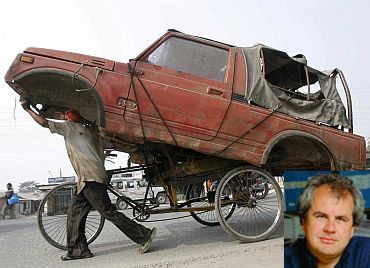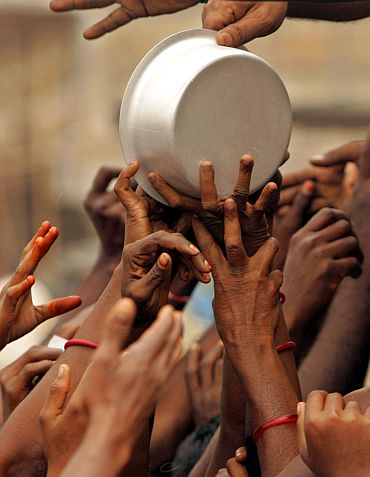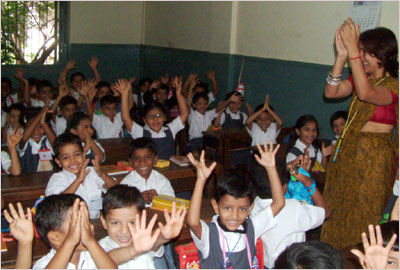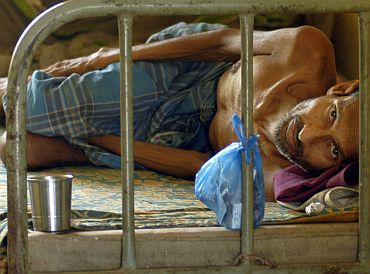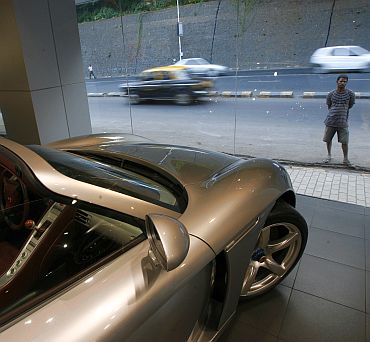 | « Back to article | Print this article |
'Absenteeism, corruption have weakened India'
Professor Lant Pritchett admires India but is willing to argue with passion that it is also a 'flailing' State.
A faculty chair of the master's in public policy in the international development programme at Harvard's Kennedy School of Government, Professor Pritchett was also the lead socio‑economist at the World Bank's South Asia region's social development group, and lived in Delhi between 2004 and 2007.
With a doctorate in economics from the Massachusetts Institute of Technology, he went on to become the co‑author and team member for many World Bank publications, including Better Health Systems for India's Poor: Findings, Analysis, and Options. Professor Pritchett talks to rediff.com's Arthur J Pais.
You have talked at length how Vikas Swarup's book Q & A made you think more about the Indian administrative system. This was before the book became the film Slumdog Millionaire.
As I was reading it, I thought that I spent all day reading supposedly factual descriptions of India but which never captured any of these things. The novel opens with its young hero winning a game show but not yet having his million rupees. Instead, he is beaten up in a police station because the game show producer has paid off the police to extract a false confession of cheating rather than pay out the million. For me, this was a vivid example of day‑to‑day corruption in India.
What struck me about the novel was that bad behaviour by the government was not a theme of the book nor was it ever remarked upon. Instead, these descriptions were there to provide verisimilitude of a real person's life -- to make the book seem realistic and in touch with the 'true' India.
I was curious about the writer, and was stunned when I found out that he (Swarup) was a high-ranking government official. I was struck by the suggestion in the book that there is a huge difference in what the bureaucracy says and what it knows and does. This was not some alienated left-wing intellectual writing a novel that was true to life, it wasn't some expatriate; this was a ranking member of one of the bureaucracies that runs the country.
'Reality out of the bubble is very different'
I think because he is a bureaucrat, he decided to make it fiction.
That's right! He created this thin cover that this is fiction but everyone immediately accepts it. Had he tried to argue these factual positions, the bureaucracy would have come down and denied the police corruption, the government bureaucracy.
To understand the Indian State today one has to read fiction that acknowledges it is fiction like Q & A -- in addition to the writings of social critics -- because it is truly non‑fiction.
Otherwise, we have to believe the streams of government reports and commissions and documents produced by official agencies -- including of those foreign agencies working with the government -- offer us, which is truly fiction.
When I see the Indian elite, and I hear the talk about how India is improving all around, I feel I am observing a bubble. The reality out of the bubble is very different. People in the rural areas, just a few minutes drive from the elite bubbles, live in a literally different world. The reality on the ground: There is complete chaos.
India's problem is unique: It is simultaneously a 21st century country, and at the same time many parts of the country have same if not more nutritious food than the worst part of Africa, as many academics, including Amartya Sen, have pointed out.
One thing that makes many aspects of public discourse about change in India so difficult is that there is the on‑the‑books reality and there is the lived reality -- and they are completely different in almost every regard, and everybody knows they are. And yet it is very difficult to make the lived reality part of the policy discourse.
'India's capability to implement policies is weak'
You argue that India is a flailing State.
But I must also say that there should not be confusion between a failing/failed and flailing State. I doubt that, unlike its neighbours, India is a failing State. I cannot deny the Indian economy is booming. India's democracy, by any measure, continues to astound.
Except for the Emergency rule of two years under Indira Gandhi in the mid 1970s, free and fair elections are held and control of the government changes hands regularly. It is also able to maintain the basics of law and order and security -- with some exceptions in Naxalite-controlled areas, and separatist movements on its edge.
India has maintained all the features of a modern democratic polity: Electoral democracy, an active Parliament with constraints on the executive, respect for human rights, a free press, an independent judiciary. The Government of India and its personnel at the top in elite institutions are impressive indeed.
The thing that first impresses you coming from the United States or other any Western country about India is the incredibly high quality of the people you interact with. The Indian Supreme Court, the Indian Institutes of Technology, the All India Institute of Medical Sciences, India's nuclear programme, are all world class institutions.
The Indian Administrative Service is full of officers who have passed an entrance examination and selection process that makes getting into Harvard look like a walk in the park.
I have worked for the World Bank and, never mind what many critics of the bank say, it employs really brilliant people. I think the Indian elite and many Indian government officials in the IAS are even better than the World Bank brains.
The brains of the Indian State can formulate excellent policies and programmes in nearly every domain. The head is so strong it can even remain in teetering control of the mountain of official paperwork.
No one who has visited the offices of senior IAS officers can help but be awed at the amount of paperwork they handle -- and be simultaneously horrified by the amount they have to.
The capability of the Indian State to implement programmes and policies is weak -- and in many domains it is obviously not improving. In police, tax collection, education, health, power, water supply -- in nearly every routine service -- there is rampant absenteeism, indifference, incompetence, and corruption.
'For India, we need a new category'
How does one reconcile the contradictions of a booming economy and democracy with world-class elite institutions and yet chaotic conditions in providing service of the most rudimentary type?
I argue that for India we need a new category. I argue that India is today a flailing State: A nation‑State in which the head, that is the elite institutions at the national and in some states, remains sound and functional but that this head is no longer reliably connected via nerves and sinews to its own limbs.
In many parts of India in many sectors, the everyday actions of the field level agents of the State -- policemen, engineers, teachers, health workers -- are increasingly beyond the control of the administration at the national or state level.
Some of the brilliant IAS officers in India are put in charge of a department by the ruling party members, who expect them to bring revenue to the party coffers.
Take the example of getting admission into private schools. There are regulations about getting into school -- the fees, the admission process -- and then there is the actuality of getting into school: A negotiated 'donation' or 'gift' where on the one hand it is not explicitly stated that you have to do it, but on the other hand it is well understood just across the board that if you can and don't, you won't get in.
Every single aspect of policy and policy implementation in India often begins from the paper reality; but the paper reality has no bearing on what is actually happening. You can reform the paper reality again and again, and just have no impact. So, this disconnect just makes everything about the public and policy discourse in India just so much more difficult.
And this is true in case of rural health services. The good work that the NGOs are doing is only a very small fraction of what needs to be done, and in not doing that there is a devastating administrative failure.
'Babus are overpaid, even by Indian standards'
One of them involves the study and experiment conducted by a group of academics, who worked with Seva Mandir, a local NGO active in Rajasthan. Their initial investigations revealed that health issues were crucially important and yet an extended careful tracking study of the attendance of the medical staff at local level facilities -- sub‑centres and public health centres -- confirmed what earlier studies had shown: That attendance on any given day was only around one‑half.
This, of course, led most people to seek health care elsewhere.
The rich used private doctors and clinics while the poor resorted to what are euphemistically called 'less than fully qualified providers', which range from traditional healers -- bhopas -- to 'Bengali doctors' (individuals with some literacy who give injections and dispense drugs).
To address staff absenteeism, NGO worked with and devised a scheme that would be implemented as the government moved to put two ANM (auxiliary nurse midwives) into each clinic.
The ANMs had to keep strict track of their time -- using a time clock that would date stamp their attendance records -- and the NGO would double‑check these official attendance records with spot checks. The ANMs who missed more than one half of the assigned days without a legitimate excuse would have their pay docked.
Moreover, to reduce complaints that absence was the result of other duties, the government declared that one day would be the 'monitored' day on which ANMs would have no other duties. It was hoped this would raise attendance and improve the services.
The results of the study were presented at an MIT conference. Its title says a lot: Band‑aid on a corpse: Incentives for nurses in the Indian public health‑care system. Despite all the incentives and checking, there was hardly any improvement because of not only an ingrained system of work ethics -- a lack of them -- and lacking will on the part of the administration to insist overall adherence to rules.
Again and again, in my Indian sojourns and in studying Indian government servants, particularly at the lower levels, I have found them to be overpaid, even by Indian standards. This may come as a surprise to many.
'Learning achievement in government schools is abysmal'
How can it induce the correct behaviour in the job when they cannot even assure attendance? Feasible attendance rates -- given illness, other duties, emergencies, etc -- are almost certainly more than 90 per cent.
If absence rates are above 10 per cent, an organisation has a management problem; if they are more than 15 percent it has a management crisis. But when one‑half to two‑third of workers do not show up, that reflects not the management of a particular school or district or agency, but rather a more severe system crisis.
The learning achievement in the government schools in India is frequently abysmally low. A small study by Pratichi Trust (an NGO founded by Nobel Laureate Amartya Sen) in West Bengal found that among third and fourth‑grade students in government schools -- who had not hired private tutors -- only 7 per cent could write their own name.
Another study in Andhra Pradesh revealed only 12 per cent of students tested in government schools in standards two to five could do single digit subtraction. Once again, the government is not able to demand better work from school supervisors and teachers.
You have said before that many of the brilliant IAS officers are not able to make much headway in India.
There many people in India who believe that it is the way in which democracy has evolved in India that has undermined, rather than strengthened, administrative modernism in India.
In their private mood, IAS officers often bemoan their work. They will say that a good IAS officer is the one who takes the money and does the job while a bad one takes the money and doesn't do the job.
Naresh Saxena, a former IAS officer, has written about why the IAS officers fail, particularly in a paper for the National Advisory Council. His honesty and courage is breathtaking. He airs a common view of the civil service that things are going downhill, in large part because the integrity and non‑partisan character of the civil service have deteriorated.
'In India, one is uncertain about the near future'
A change in chief minister or even a Cabinet minister can bring reforms to a halt. As long as reforms are dependent on a particular civil servant -- rather than politicians, who even with anti‑incumbency bias sometimes have a longer and more protected tenure in office -- it is difficult for reforms to take hold.
Yet you don't think India is going to be a failing State.
True, and for many good reasons; I have talked about many of them previously in the interview. There is another observation I have made in a paper.
Let us suppose a development expert from a modern, well‑governed country, say Norway, were told he was travelling to a foreign country. But he is transported in a time machine to Chicago in 1929. He would find a booming economy, but corrupt politics, huge social tensions across races and ethnicities, vast economic inequalities, barely functional municipal services, unplanned and unregulated expansion of the city in all directions as it was crowded with immigrants from rural areas and from other nations.
What is his forecast? Should he be optimistic or pessimistic?
What is his prescription? Where does one start with 'reform' when everything seems out of control?
From the hindsight of history, he should be optimistic. Chicago, while far from being Norway, is a rich, vibrant, and functional city.
Modern India was born and has always lived in a democratic tradition, but has increasing weakness in the adoption of administrative modernism to its society and politics.
To paraphrase Abraham Lincoln via Naresh Saxena, no government can long survive half‑democratic and half‑corrupt. India, with its multitude of reform efforts, is struggling on the path to reforms that lead to the effective implementation of rules; but they are far from out of the woods.
In India, one is uncertain about the near future -- and even, for that matter, about what is really happening in the present. But, as India's formal political and administrative institutions are roughly those of many advanced nations, one can imagine India 50 years in the future without having had any major institutional shifts but having made a long hard steady slog to prosperity and governmental efficacy. So long‑run uncertainty is less.
In contrast, in China one is very confident about the present. But transitions in authoritarian regimes have, in many instances, been very problematic, and accompanied both in Chinese history and in recent practice, led to long interruptions in both economic and social progress. So, the long‑run future of China is especially uncertain.
